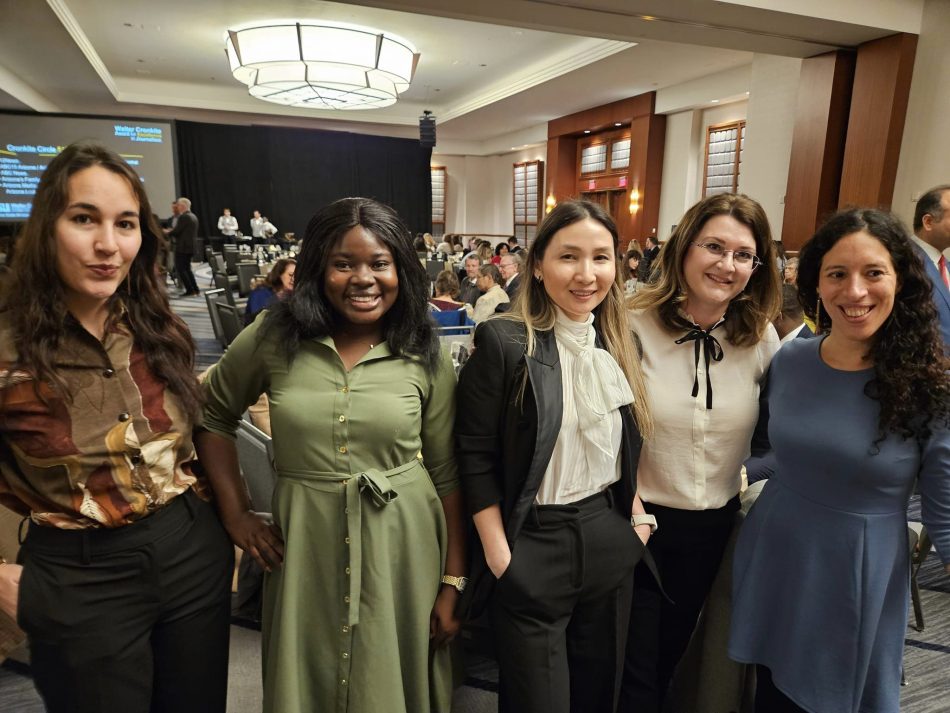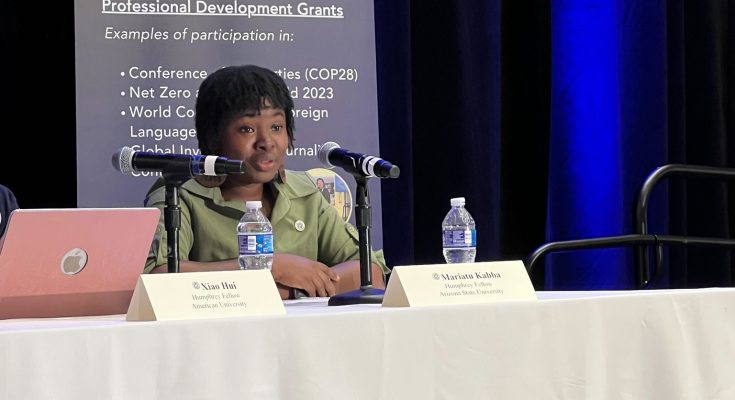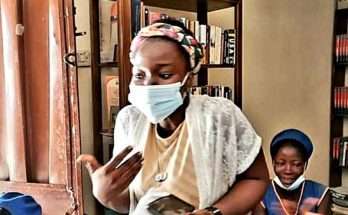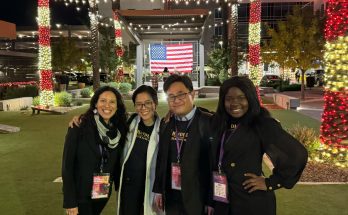As the world celebrates International Women’s Day 2024 under the theme “Accelerate Progress,” it is imperative to reflect on the status of women’s rights in different parts of the world. In this brief comparative analysis, I delved into some of the realities women face in the United States, where I have been studying for the past nine months, and my country, Sierra Leone. I highlighted the challenges, progress, and path to achieving gender equality.
The comparison between the United States and Sierra Leone might seem far-fetched. Still, it is essential to recognize that the struggle for gender equality is not exclusive to one country or region. Women around the world face similar challenges, albeit in different contexts. Both nations grapple with issues of female political representation, gender-based violence, and economic disparities. As such, it is crucial to examine the status of women in these two countries and explore ways to accelerate progress towards gender equality.

Gender Equality Index
The Gender Inequality Index (GII) is vital for measuring gender disparities in different countries. In 2018, Sierra Leone ranked 153rd out of 162 countries, with a GII value of 0.644. The United States, on the other hand, ranked 51st out of 162 countries, with a GII value of 0.188. While the US has made significant progress towards gender equality, the country still faces challenges, particularly about female representation in politics and gender-based violence.
The Sierra Leonean Perspective
Sierra Leone is a country on the Atlantic West coast of Africa with a rich culture and history. However, it faces significant gender disparities and social accountability issues. Despite comprising 52% of the country’s population, women are underrepresented in political positions. As of February 2021, only 12.3% of parliamentary seats and four out of 32 cabinet positions were held by women.
In 2023, Sierra Leone passed the Gender Equality and Women’s Empowerment law, which mandates a 30% quota for women’s participation in government positions, including appointed and elected roles. This law is expected to bring about positive changes, such as improving women’s access to finance, employment opportunities, equal pay, maternity leave, and political representation. The Ministry of Gender and Children’s Affairs coordinates efforts to mainstream gender considerations across sectors and implement policies for women’s empowerment.
Education is crucial for empowering women and promoting gender equality. However, only 40% of girls attend secondary school compared to 56% of boys in Sierra Leone. Women and girls face discriminatory laws related to marriage, divorce, inheritance, and family relations. Almost 30% of women between 20 and 24 were married or in a union before turning 18. Addressing these gender data gaps is essential to achieve gender-related SDG commitments in Sierra Leone.
Economic disparities between genders are also significant in Sierra Leone. Women are more likely to be unemployed, poor, and illiterate than men. The gender pay gap is substantial, with women earning only 52 cents for every dollar earned by men. The maternal mortality rate is one of the highest in the world, and women face significant challenges in accessing quality healthcare.
There are also significant gaps in areas such as unpaid care and domestic work, gender and poverty, physical and sexual harassment, women’s access to assets (including land), and gender and the environment. Women’s health and well-being are crucial for promoting gender equality. In Sierra Leone, only 53% of women had access to modern methods of family planning in 2019, and almost 20% of those aged 15-49 reported experiencing physical and sexual violence by a current or former intimate partner within the past year.
Monitoring progress towards gender-related SDG targets in Sierra Leone remains challenging, as only 41.7% of the required indicators were available as of December 2020.

The US Perspective
Shifting our focus to the United States, a nation synonymous with democratic ideals and progress, I encounter a distinct yet interconnected narrative of women’s struggles and triumphs. Despite significant strides in women’s rights, the US continues to grapple with gender disparities, particularly in political representation and economic empowerment. The recent wave of women’s activism, epitomized by movements like #MeToo and #TimesUp, underscores a resounding call for gender equality and inclusivity in American society. However, there is still a long way to go. The lack of a female president in the US raises questions about the glass ceiling that still exists in the political sphere. Women’s representation in Congress remains disproportionately low, with only 28.5 percent of seats held by women. The gender gap in political representation is particularly evident in local governments, where women hold only 30 percent of elected positions.
While women in the US have made significant progress in education and literacy rates, with 91 percent of women aged 25 and over having completed high school, they still face challenges in accessing higher education. Only 36 percent of women aged 25 and over have completed a bachelor’s degree or higher.
Regarding economic empowerment, women’s labor force participation increased from 43 percent in 1970 to 57 percent in 2016. However, women still face challenges in accessing equal pay and leadership positions. According to the 2021 US Census Bureau’s American Community Survey, women comprise 44% of the workforce but only 41% of managers. Women earn around 82 cents for every dollar men earn, resulting in a pay gap of 18 cents on the dollar.
According to an article published by The 19th News in 2023, the gender pay gap is even more significant for full-time female managers, who earn an estimated 77 cents for every dollar earned by full-time male managers, resulting in a pay gap of 23 cents on the dollar. Women in specific sectors face an even wider pay gap, with self-employed women earning only 69 cents for every dollar men earn. However, women in private, for-profit companies earn around 78 cents for every dollar earned by men, and women in government agencies and non-profit organizations earn around 85 cents for every dollar earned by men.
Moreover, the pay gap is even more significant for women in historically underserved racial and ethnic groups compared to White women. Latinas earn around 58 cents for every dollar earned by White men. In comparison, Black or African American women earn around 63 cents for every dollar earned by White men, and White women earn around 79 cents for every dollar earned by White men.
Women without a high school diploma earn only 66 cents for every dollar men earn, while women with a bachelor’s degree earn around 70 cents for every dollar. The gender pay gap, gender discrimination, and underrepresentation of women, especially women of color, in leadership positions continue to be pressing issues.
Although laws and policies exist to protect women’s rights in the US, the effectiveness of their implementation remains a concern. The need for a more diversified form of leadership underscores the importance of changing approaches to drive meaningful change. Women in the US face challenges related to access to healthcare, with women of color being particularly vulnerable to health disparities. Additionally, gender-based violence is a significant issue, with one in three women experiencing physical or sexual violence in their lifetime.
Moving Forward
Despite the disparities in their contexts, the United States and Sierra Leone share a common goal of advancing women’s rights and accelerating progress toward gender equality. As we commemorate International Women’s Day 2024, women’s narratives in the US and Sierra Leone remind us of the work ahead in accelerating progress toward gender equality. Both nations must bridge the gap between policy and practice, ensuring that laws protecting women’s rights are effectively implemented.
As I advocated in my speech at the 2023 Humphrey Global Leadership Forum in Washington, DC, investing in diverse forms of leadership can lead to a more inclusive and equitable society.
We need to address the root causes of gender inequality, including discriminatory laws, cultural norms, and social attitudes. We must promote women’s political participation, ensure equal access to education and economic opportunities, and address health disparities that disproportionately affect women. It is time for us to accelerate progress towards gender equality and create a world where women can thrive and fulfill their potential.
Empowering women economically, politically, and socially is a moral and strategic necessity for sustainable development. By amplifying women’s voices, dismantling barriers to their advancement, and fostering a culture of gender equality, the US and Sierra Leone can create a more just and prosperous future for all.
On this International Women’s Day, let us recommit ourselves to the cause of gender equality, recognizing that actual progress is achieved when women are empowered to lead, thrive, and shape the world around them.




